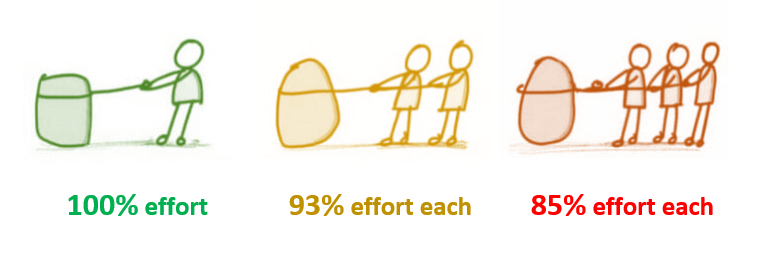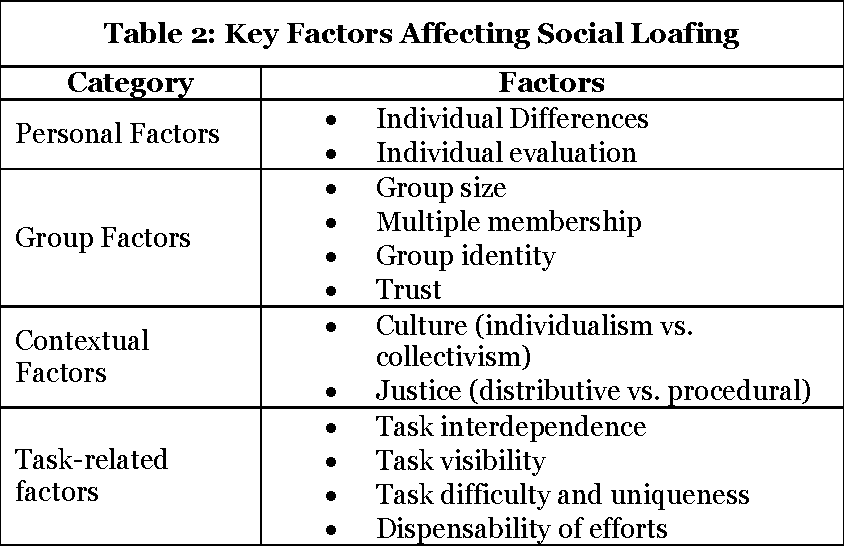Social Loafing
Explore the concept of social loafing, understand its impact on group work, and discover effective strategies to mitigate it and boost productivity.


Explore the concept of social loafing, understand its impact on group work, and discover effective strategies to mitigate it and boost productivity.
Social loafing is a phenomenon in cooperative learning where individuals exert less effort than they would if working alone. This happens because individuals in a group feel less responsible for the outcome and believe that their individual effort is not necessary for the group's success.
Social loafing is often seen in situations where individuals are assigned individual tasks, but the overall outcome is determined by the collective effort of the group.
Social loafing can have a negative impact on group work in schools. It can lead to reduced productivity, as individual efforts are not as high as they would be if each person worked alone and it can cause frustration among group members. Implementing proper scaffolding strategiescan help address these challenges. Additionally, it can create a sense of inequity, as some students may feel like they are doing more work than others.
As a teacher, facilitating group work is an essential part of your job. Understanding effective classroom management strategies can help you manage group dynamics better. Group work not only helps develop important skills such as communication and teamwork but also provides a valuable learning experience for students. However, group work can present challenges, such as social loafing. Social loafing in the context of in schools and provide advice for teachers to combat it.
the theoretical implications and practical steps teachers can take to keep everyone accountable in group work.
Social loafing was discovered by social psychologist Bibb Latané through research showing that individuals put forth less effort in group tasks. The phenomenon is rooted in social psychology theory that explains how group dynamics affect individual motivation and accountability. This research has shaped how educators understand and manage group work in educational settings.
Social loafing is a phenomenon in social psychology where individuals exert less effort when working in a group than they would if working alone. This theory is rooted in research conducted by Bibb Latané, who discovered that individuals were less likely to put forth their full effort when working on a , as compared to an individual one.
The amount of effort an individual puts forth is influenced by the motivation of the task at hand. In other words, individuals are more likely to put in effort when they believe their contribution is necessary for project success.
The Collective Effort Model (CEM) is a theoretical framework used to explain social loafing. It proposes that social loafing tendency is determined by two factors: the chance of team members receiving personal credit and the meaningfulness of the task.
CEM suggests that team size is positively related to social loafing behaviour, meaning that the larger the group, the greater the chance of social loafing. However, CEM also suggests that this behaviour can be mitigated by increasing the meaningfulness of the task at hand.

In 1993, Karau and Williams conducted a meta-analytic review of social loafing research. Their findings supported the idea that social loafing is more likely to occur in collective tasks as compared to individual tasks.
They also found that social loafing is more likely to occur in daily tasks as opposed to meaningful ones. This research highlights the importance of meaningful tasks in engagement and individual accountability.
More recent research has explored the role of in combatting social loafing. organisations can use a variety of techniques to encourage individual accountability and reduce the likelihood of social loafing.
For example, managers can use individual accountability measures, such as progress tracking or task assignments, to increase individual motivation and decrease social loafing. Additionally, organisations can use team-building exercises to increase the perceived meaningfulness of the task at hand, and create a sense of shared responsibility for project success.
Social loafing is a well-established theory in social psychology, rooted in historical research by Bibb Latané. The Collective Effort Model suggests that social loafing behaviour is influenced by the chance of receiving personal credit and the meaningfulness of the task.
Recent research has highlighted the importance of meaningful tasks in and individual accountability.

Social loafing reduces overall productivity because individual efforts drop below what students would achieve working alone. It creates frustration and inequity among group members when some students feel they are carrying more of the AI tools to reduce workload than others. This can damage team cohesion and prevent students from developing essential collaboration skills.
Social loafing can have a significant impact on the performance of a group. When individuals do not put in the necessary effort, the overall performance of the group suffers. This can lead to lower grades, incomplete projects, and a lack of motivation for future group work.
In addition, social loafing can lead to burnout for team members who do put in effort. When individuals feel like they are the only ones working towards the group's goal, they can become resentful and exhausted, leading to a lack of student engagement in future group work. This can particularly affect wellbeing and create additional challenges for students with sen who may struggle with group dynamics. Teachers can address these issues through proper feedback mechanisms and by understanding social cognitive theories that explain group behaviour. Additionally, some students may experience social anxiety which can compound these problems, making sel strategies essential for effective group work.

Given these potential negative impacts, for teachers to understand the factors that contribute to social loafing and implement strategies to prevent it. These strategies can include setting clear goals, assigning individual roles, providing regular feedback, and promoting a sense of shared responsibility for the group's success.
To combat social loafing, teachers can implement strategies like assigning clear roles, providing regular feedback, and emphasising individual accountability. Creating a sense of shared responsibility and ensuring tasks are meaningful can also reduce loafing.
One of the most effective ways to combat social loafing is to assign individual roles to each member of the group. This ensures that each person is responsible for a specific task and that their contribution is visible to the rest of the group. When students know that their individual work matters, they are more likely to put in the effort needed to succeed.
Another important strategy is to provide regular feedback to students throughout the group work process. This feedback should be specific, timely, and focused on both individual and group performance. By providing regular feedback, teachers can help students stay on track and motivated, as well as identify and address any issues that may be contributing to social loafing.
In addition, create a sense of shared responsibility for the group's success. This can be done by emphasising the importance of teamwork and collaboration, as well as by providing opportunities for students to share their ideas and perspectives. When students feel like they are part of a team, They are more inclined to invest the effort needed to achieve the group's goals.
Making the tasks meaningful is also a crucial element. When students perceive the task as relevant and engaging, they are more motivated to participate actively. Teachers can achieve this by linking tasks to real-world scenarios, allowing students to choose topics of interest, or incorporating elements of gamification to increase student engagement.
Finally, teachers can use a variety of assessment methods to evaluate student performance in group work. These methods can include individual assessments, peer evaluations, and group presentations. By using a variety of assessment methods, teachers can get a more complete picture of student performance and identify any areas where students may be struggling.
Here is a summary of the practical ways teachers can prevent social loafing in classroom group work:
Social loafing is a common challenge in group work, but it is not insurmountable. By understanding the factors that contribute to social loafing and implementing strategies to prevent it, teachers can create a more positive and productive learning environment for their students. When students feel like they are part of a team and that their individual work matters, They are more prone to contribute the effort needed to succeed.
In addition, teachers can use classroom management techniques to set clear expectations for student behaviour, create a supportive and inclusive classroom environment, and provide opportunities for students to develop their social and emotional skills. By creating a positive and supportive learning environment, teachers can help students feel more comfortable taking risks, sharing their ideas, and working collaboratively with others.
Ultimately, by proactively addressing social loafing, educators can transform group projects into powerful learning experiences that creates collaboration, accountability, and a deeper understanding of the subject matter.
For teachers seeking to examine deeper into the research and theory surrounding social loafing and strategies for effective group work, the following resources are recommended:
Social loafing is a phenomenon in cooperative learning where individuals exert less effort than they would if working alone. This happens because individuals in a group feel less responsible for the outcome and believe that their individual effort is not necessary for the group's success.
Social loafing is often seen in situations where individuals are assigned individual tasks, but the overall outcome is determined by the collective effort of the group.
Social loafing can have a negative impact on group work in schools. It can lead to reduced productivity, as individual efforts are not as high as they would be if each person worked alone and it can cause frustration among group members. Implementing proper scaffolding strategiescan help address these challenges. Additionally, it can create a sense of inequity, as some students may feel like they are doing more work than others.
As a teacher, facilitating group work is an essential part of your job. Understanding effective classroom management strategies can help you manage group dynamics better. Group work not only helps develop important skills such as communication and teamwork but also provides a valuable learning experience for students. However, group work can present challenges, such as social loafing. Social loafing in the context of in schools and provide advice for teachers to combat it.
the theoretical implications and practical steps teachers can take to keep everyone accountable in group work.
Social loafing was discovered by social psychologist Bibb Latané through research showing that individuals put forth less effort in group tasks. The phenomenon is rooted in social psychology theory that explains how group dynamics affect individual motivation and accountability. This research has shaped how educators understand and manage group work in educational settings.
Social loafing is a phenomenon in social psychology where individuals exert less effort when working in a group than they would if working alone. This theory is rooted in research conducted by Bibb Latané, who discovered that individuals were less likely to put forth their full effort when working on a , as compared to an individual one.
The amount of effort an individual puts forth is influenced by the motivation of the task at hand. In other words, individuals are more likely to put in effort when they believe their contribution is necessary for project success.
The Collective Effort Model (CEM) is a theoretical framework used to explain social loafing. It proposes that social loafing tendency is determined by two factors: the chance of team members receiving personal credit and the meaningfulness of the task.
CEM suggests that team size is positively related to social loafing behaviour, meaning that the larger the group, the greater the chance of social loafing. However, CEM also suggests that this behaviour can be mitigated by increasing the meaningfulness of the task at hand.

In 1993, Karau and Williams conducted a meta-analytic review of social loafing research. Their findings supported the idea that social loafing is more likely to occur in collective tasks as compared to individual tasks.
They also found that social loafing is more likely to occur in daily tasks as opposed to meaningful ones. This research highlights the importance of meaningful tasks in engagement and individual accountability.
More recent research has explored the role of in combatting social loafing. organisations can use a variety of techniques to encourage individual accountability and reduce the likelihood of social loafing.
For example, managers can use individual accountability measures, such as progress tracking or task assignments, to increase individual motivation and decrease social loafing. Additionally, organisations can use team-building exercises to increase the perceived meaningfulness of the task at hand, and create a sense of shared responsibility for project success.
Social loafing is a well-established theory in social psychology, rooted in historical research by Bibb Latané. The Collective Effort Model suggests that social loafing behaviour is influenced by the chance of receiving personal credit and the meaningfulness of the task.
Recent research has highlighted the importance of meaningful tasks in and individual accountability.

Social loafing reduces overall productivity because individual efforts drop below what students would achieve working alone. It creates frustration and inequity among group members when some students feel they are carrying more of the AI tools to reduce workload than others. This can damage team cohesion and prevent students from developing essential collaboration skills.
Social loafing can have a significant impact on the performance of a group. When individuals do not put in the necessary effort, the overall performance of the group suffers. This can lead to lower grades, incomplete projects, and a lack of motivation for future group work.
In addition, social loafing can lead to burnout for team members who do put in effort. When individuals feel like they are the only ones working towards the group's goal, they can become resentful and exhausted, leading to a lack of student engagement in future group work. This can particularly affect wellbeing and create additional challenges for students with sen who may struggle with group dynamics. Teachers can address these issues through proper feedback mechanisms and by understanding social cognitive theories that explain group behaviour. Additionally, some students may experience social anxiety which can compound these problems, making sel strategies essential for effective group work.

Given these potential negative impacts, for teachers to understand the factors that contribute to social loafing and implement strategies to prevent it. These strategies can include setting clear goals, assigning individual roles, providing regular feedback, and promoting a sense of shared responsibility for the group's success.
To combat social loafing, teachers can implement strategies like assigning clear roles, providing regular feedback, and emphasising individual accountability. Creating a sense of shared responsibility and ensuring tasks are meaningful can also reduce loafing.
One of the most effective ways to combat social loafing is to assign individual roles to each member of the group. This ensures that each person is responsible for a specific task and that their contribution is visible to the rest of the group. When students know that their individual work matters, they are more likely to put in the effort needed to succeed.
Another important strategy is to provide regular feedback to students throughout the group work process. This feedback should be specific, timely, and focused on both individual and group performance. By providing regular feedback, teachers can help students stay on track and motivated, as well as identify and address any issues that may be contributing to social loafing.
In addition, create a sense of shared responsibility for the group's success. This can be done by emphasising the importance of teamwork and collaboration, as well as by providing opportunities for students to share their ideas and perspectives. When students feel like they are part of a team, They are more inclined to invest the effort needed to achieve the group's goals.
Making the tasks meaningful is also a crucial element. When students perceive the task as relevant and engaging, they are more motivated to participate actively. Teachers can achieve this by linking tasks to real-world scenarios, allowing students to choose topics of interest, or incorporating elements of gamification to increase student engagement.
Finally, teachers can use a variety of assessment methods to evaluate student performance in group work. These methods can include individual assessments, peer evaluations, and group presentations. By using a variety of assessment methods, teachers can get a more complete picture of student performance and identify any areas where students may be struggling.
Here is a summary of the practical ways teachers can prevent social loafing in classroom group work:
Social loafing is a common challenge in group work, but it is not insurmountable. By understanding the factors that contribute to social loafing and implementing strategies to prevent it, teachers can create a more positive and productive learning environment for their students. When students feel like they are part of a team and that their individual work matters, They are more prone to contribute the effort needed to succeed.
In addition, teachers can use classroom management techniques to set clear expectations for student behaviour, create a supportive and inclusive classroom environment, and provide opportunities for students to develop their social and emotional skills. By creating a positive and supportive learning environment, teachers can help students feel more comfortable taking risks, sharing their ideas, and working collaboratively with others.
Ultimately, by proactively addressing social loafing, educators can transform group projects into powerful learning experiences that creates collaboration, accountability, and a deeper understanding of the subject matter.
For teachers seeking to examine deeper into the research and theory surrounding social loafing and strategies for effective group work, the following resources are recommended:
{"@context":"https://schema.org","@graph":[{"@type":"Article","@id":"https://www.structural-learning.com/post/social-loafing#article","headline":"Social Loafing","description":"Explore the concept of social loafing, understand its impact on group work, and discover effective strategies to mitigate it and boost productivity.","datePublished":"2023-04-28T14:12:01.743Z","dateModified":"2026-01-26T10:09:32.212Z","author":{"@type":"Person","name":"Paul Main","url":"https://www.structural-learning.com/team/paulmain","jobTitle":"Founder & Educational Consultant"},"publisher":{"@type":"Organization","name":"Structural Learning","url":"https://www.structural-learning.com","logo":{"@type":"ImageObject","url":"https://cdn.prod.website-files.com/5b69a01ba2e409e5d5e055c6/6040bf0426cb415ba2fc7882_newlogoblue.svg"}},"mainEntityOfPage":{"@type":"WebPage","@id":"https://www.structural-learning.com/post/social-loafing"},"image":"https://cdn.prod.website-files.com/5b69a01ba2e409501de055d1/6944552d4259f879031f75a8_686fcaa8e84cf4ff5a338d9d_Social%2520Loafing%2520in%2520Group%2520Dynamics.png","wordCount":2694},{"@type":"BreadcrumbList","@id":"https://www.structural-learning.com/post/social-loafing#breadcrumb","itemListElement":[{"@type":"ListItem","position":1,"name":"Home","item":"https://www.structural-learning.com/"},{"@type":"ListItem","position":2,"name":"Blog","item":"https://www.structural-learning.com/blog"},{"@type":"ListItem","position":3,"name":"Social Loafing","item":"https://www.structural-learning.com/post/social-loafing"}]}]}